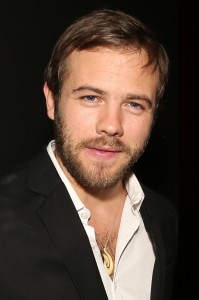
Dungarvan and Waterford can be very proud of Moe Dunford, the star of ‘Patrick’s Day’. See News 20 for more on last Wednesday’s screening at the SGC.
A couple of years ago, Harrison Ford was, presumably, paid a stack of cash to talk about the emotional power of film for a Sky Movies commercial.
You know, how one particular flick can stop you in your tracks, freeze you in time and take you to a particularly poignant place in one’s memory – and how that one part of you that fell in love with those glorious images beamed across a giant screen in a dark auditorium, forever stayed in that moment.
Sure, it was a little hokey, reminiscent of the saccharine, empty guff we hear at every Oscar ceremony, but those words never left me, and, indeed, its sentiment returned to hit me right between the eyes at Dungarvan’s SGC last Wednesday night.
As I stood and applauded in the company of over 200 others (plus 350 more in two other SGC screenings that same night) while the end credits of ‘Patrick’s Day’ rolled, I knew I’d just seen a film that struck a chord with me, that resonated in a way that popcorn munching, overblown, effects-laden fare cannot and will not ever.
Directed by Terry McMahon and starring Dungarvan’s Moe Dunford, ‘Patrick’s Day’ hauntingly captures the tragedy, the sadness and the isolation of mental illness.
As Today FM film reviewer Ed Smith (who MC’d a compelling post-film question and answer session afterwards) aptly pointed out, this is a film in which loneliness proves as central a theme as mental illness itself.
And in an age where there many, many lonely people in this country, one can’t help feeling this McMahon/Dunford collaboration is as timely as it is necessary.
This may well be the defining Irish film of its generation, and with 10 international awards garnered to date, this powerful, gut-wrenching, beautiful piece of work has been deservedly lauded and heralded.
To synopsise, ‘Patrick’s Day’ tells the story of Patrick (Dunford), an institutionalised man in his late 20s/early 30s who was diagnosed with Schizophrenia at the age of 14.
After he’s separated from his protective mother, Maura (Kerry Fox) at a Saint Patrick’s Day Parade in Dublin, Patrick meets an air hostess named Karen (played by Catherine Walker), with whom he becomes intimate.
Karen has her own demons; we see her attempt an overdose in a hotel bathroom only to be ‘saved’, albeit indirectly, by Patrick and Maura.
Thereafter, without giving too much of the plot away, Maura, with the help of a world weary policeman (Philip Jackson) attempts to persuade Patrick, who suffers from visions that distort his sense of reality, that Karen was merely another vision of his. This preamble goes a long, long way to explaining the movie’s tagline, ‘Love is Madness’.
‘Patrick’s Day’, and this is something it shares in common with Jim Nolan’s ‘Blackwater Angel’, is not an evening one would theme a first or second date around.
It’s one of those experiences one rarely gets to witness in a larger picture house nowadays: a film that rattles your core, 104 minutes you want to speak about to others who’ve not yet seen it and persuade them in turn to surrender to it for an evening.
It’s a powerful, heart-rending examination of the human condition, boldly and welcomingly addressing an issue which we’re finally talking about in a meaningful, consequential manner in this country: mental health.
And that we got to see this movie, two days before its general release, on Moe Dunford’s native sod (re-titled ‘Moetown’ by Terry McMahon), and support Pieta House in so doing was genuinely humbling.
At the heart of this film was, as the director put it, “a remarkable young man” in Moe Dunford, whose performance ranks among the greatest I’ve ever seen from an Irish actor. Seeing truly is believing; no words of mine can do justice to how magnificently Moe captured the essence of the raw, stomach churning “unspoken horror” (as Ed Smith put it) that life is for so many men and women with diagnosed (and undiagnosed) mental illness.
“Patrick spoke to me, and he reminded me of a lot people I’ve met over the years; and none of us have to look very far to find a Patrick,” said Moe Dunford.
“It spoke to me because of the struggles people deal with in every day life, and cutting aside all the bullshit of being an actor, I just had to play this part because it spoke to me; Patrick came off the page…and there are a lot of Patricks out there, a hell of them…but you can never be quite prepared for seeing your face alongside the ‘Welcome To Dungarvan’ sign and there I am doing my best ‘Hulk’ impression!
“But to be here tonight, surrounded by so many familiar faces, means the world to me, and to have everyone supporting Pieta House tonight is just fantastic.”
Ed Smith noted the reddened faces and tear-stained cheeks of so many in the audience at the end of last Wednesday’s screening.
Unashamedly, my face was flushed with emotion and my eyelids had been inked with tears more than once while viewing this extraordinary film.
The numbness I felt was felt by many others once the projector wound down and the lights came up.
And then we talked. We listened to Moe, we listened to Terry, and it was a wonderful, communal experience, the sort of experience we can never, ever have enough of.
“Sometimes a piece of cinema becomes bigger than the some of its parts, and this film seems to be having that kind of impact,” said Terry McMahon. How right he is.

